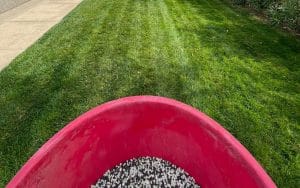As you probably know by now, proper timing is key to the success of your lawn, and that includes watering and fertilizing.
The stakes are even higher when you combine the two, which leads to exploring the topic of when should you water your lawn after fertilizing.
It’s advisable to wait for 24 hours after fertilizing your lawn to water it. The water will help activate and break down the fertilizer and feed your lawn the nutrients.
But, remember always to check the product directions on the bag, they will tell you when to water.
Keep reading to find out how long you should wait before watering lawn after treatment and how long you will need to water.
When Should You Water Your Lawn After Fertilizing

You should wait for 24 hours before watering your lawn after fertilizing if you use slow-release fertilizer or the weather is cool.
However, you can also decide to do it immediately after application to transfer the fertilizer from the grass blades to the soil.
If you use liquid fertilizer, wait until it dries (about 2 to 4 hours) before watering your lawn. On the other hand, you can immediately water if you apply granular fertilizer.
Read more: How long to keep dog off grass after fertilizing
If you applied weed treatment with the fertilizer, don’t water until it dries to prevent water from washing off the treatment before it kills the weeds.
Watering every day after fertilization may lead to an overwatered lawn, and it will also make the roots needy and shallow. Therefore, it’s better to water infrequently but deeply to encourage the growth of healthier and deeper roots.
Time your watering hours wisely as well. The best time is early in the morning before sunrise, when the temperatures are still cool so that the water won’t evaporate.
Why Water a Lawn After Fertilizing?
Watering a lawn after fertilization breaks down, activates the fertilizer, and ensures the grass receives the nutrients, which are mainly potassium, nitrogen, and phosphorus.
In addition, the water removes the fertilizer from the grass blades, transferring it into the soil where it is meant to be to nourish your yard.
Read more: Watering new grass seed
You must also water your grass after fertilizing because failing to do so leads to the grass burning. Moreover, you risk losing the fertilizer to heavy rain if you leave it sitting on the lawn without penetrating the ground.
Read more: How soon can you fertilize new sod
How Long to Water Grass After Fertilizing?
Water your lawn for about 20 minutes to ensure the soil and fertilizer are thoroughly moist. However, don’t overwater your yard that you create a puddle and wash away the fertilizer; that means controlling your lawn irrigation system well.
If the fertilizer washed away, it could contaminate nearby rivers, ponds, and streams, or groundwater. In addition, it means your grass won’t absorb the nutrients offered by the fertilizer; hence the whole project becomes a waste of time and money.
If you have a lawn sprinkler system instead of an irrigation system, make sure you move the sprinklers or hoses around for nice, uniform coverage.
Read more: Grass turning yellow after fertilizing
To help achieve even watering in your lawn, consider applying fertilizer just before your area is expected to receive a minimum 1/4-inch rainfall.
Additionally, you should keep in mind that heavy rainfall isn’t suitable for fertilizer application, as heavy downpours could flood your lawn, washing away the fertilizer.
It would also be best to avoid watering your yard for some days after the initial watering following fertilization to let the nutrients settle in the soil.
Read more: Heavy rain after laying turf
How To Use Granular Lawn Food
It would be best to avoid fertilizing your yard when it’s wet if you use granular lawn food. This is because the non-organic fertilizers can easily stick to the grass blades, activating the granules and burning your grass.
You might see brown spots in the lawn. Fortunately, you can solve this problem by watering in the fertilizer and washing off the granules from the grass blades.
How To Use Liquid Fertilizer
You can apply liquid fertilizer on a wet lawn unless the soil in your yard is heavy clay. In such as case, the fertilizer might sit on the soil surface and wash off into the waterways and drains, so wait until the soil becomes dry to apply the fertilizer.
Frequently Asked Questions
Should I water before fertilizing?
You should thoroughly water your lawn a day or two prior to fertilizing, then apply the treatment once the grass dries. The idea behind watering before fertilizing is to protect the grass blades from burning from the fertilizer.
However, remember that water may make the roots’ velamen saturated, limiting how much fertilizer will be absorbed into the soil. Therefore, water your lawn moderately.
Instead of watering your lawn, you can also time the rain, fertilizing your grass a day or two after rainfall.
How long can fertilizer sit on a lawn without watering?
Unless the air temperature is more than 85 °F (29°C), fertilizer can sit on your lawn without water for about 24 hours without burning your grass. Nonetheless, experts recommend irrigating your yard lightly but thoroughly immediately after fertilizing.
A quarter to half an inch of water is sufficient to facilitate the absorption of the nutrients and protect your grass from burning.
Will fertilizer burn grass if not watered?
Fertilizer will burn your grass if it sits for an extended period (up to 48 hours) without water. The situation is different when the air temperature is over 85 °F (29°C) in that the fertilizer can burn and volatilize the grass after 24 hours under these conditions.
Conclusion
To wrap up.
When should you water your lawn after fertilizing?
If you use liquid fertilizer, wait until it dries (about 2 to 4 hours) before watering your lawn. On the other hand, you can immediately water if you apply granular fertilizer.
An essential aspect of lawn care is knowing when and how to water your lawn after fertilizing it. The goal of fertilization is to have the roots of your grass absorb the nutrients to help your lawn thrive, and watering helps make that possible.
Make sure your lawn receives ample water to aid the health of your grass and prevent the damage of drought. Watering will also keep your grass from suffering the adverse effects of fertilizer sticking to the grass blade- burning, discoloration, and even death.

Hey there, I’m Derek Schew, a writer for Lawnholic.com, where we cover everything and anything related to lawns. As someone who’s spent countless hours tending to my own lawn, I’m passionate about sharing my knowledge and helping others achieve the perfect yard. From lawn care tips to product reviews, I’m committed to providing our readers with the most accurate and up-to-date information available. So whether you’re a seasoned lawn enthusiast or just getting started, I invite you to join our community and discover the joys of a lush, green lawn.
